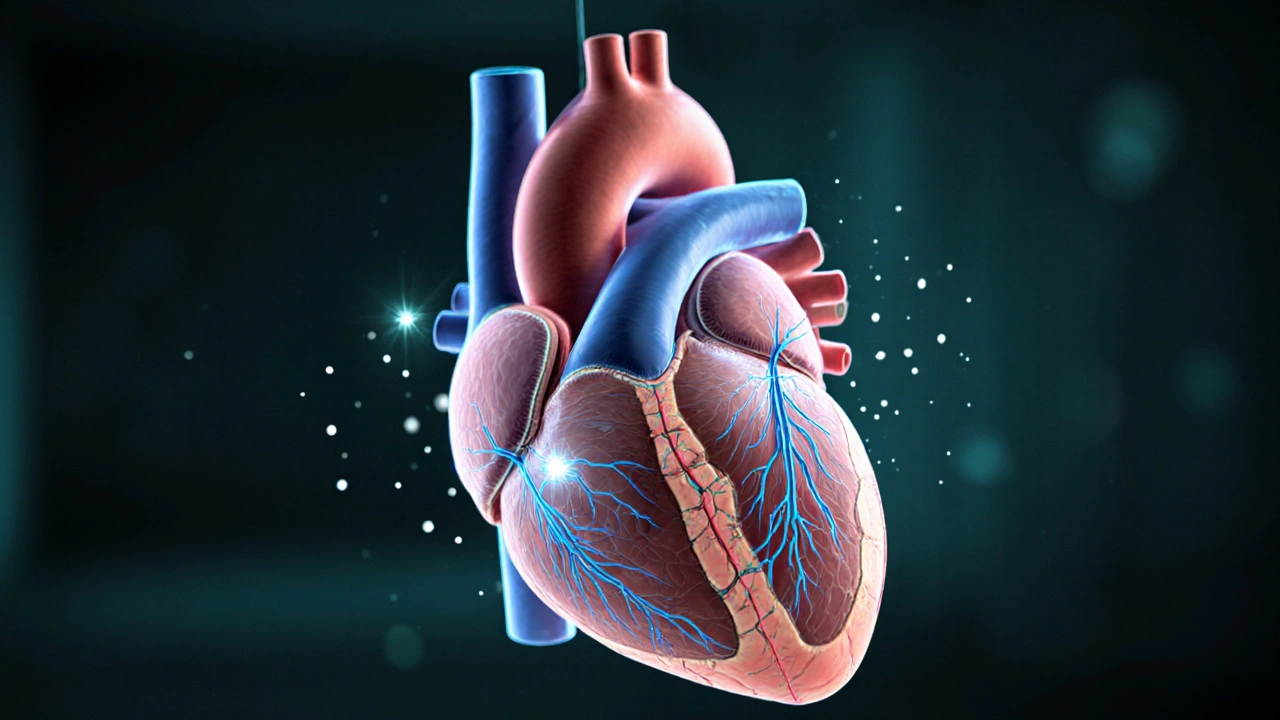Isoptin (Verapamil) vs. Other Heart Meds: A Straight‑Up Comparison

Heart Medication Selector
Find Your Best Heart Medication
Select your primary condition and side effect tolerance to see which medications might work best for you. Always consult your doctor before making any medication changes.
When doctors prescribe Isoptin (Verapamil), they’re giving a calcium channel blocker that slows the heart’s electrical signal and relaxes blood vessels. If you’re wondering how it stacks up against other heart medicines, you’re in the right place. Below you’ll find a clear‑cut look at the most common alternatives, when each shines, and what side effects to keep on your radar.
Key Takeaways
- Isoptin is best for controlling heart rate in atrial fibrillation and treating angina.
- Amlodipine excels at lowering blood pressure with a smooth side‑effect profile.
- Diltiazem shares many uses with Isoptin but tends to cause fewer constipation issues.
- Nifedipine is powerful for hypertension but can cause rapid heart‑rate spikes.
- Atenolol, a beta‑blocker, works well for high blood pressure and migraine prevention, but isn’t a calcium‑channel blocker.
How Isoptin Works
Verapamil blocks the flow of calcium ions into cardiac and smooth‑muscle cells. By doing so, it reduces the force of contraction and slows conduction through the AV node. This dual action helps with three main problems:
- High blood pressure (hypertension).
- Chest pain caused by reduced blood flow (angina).
- Irregular heart rhythms, especially atrial fibrillation.
Typical dosing for adults starts at 80mg three times a day for the immediate‑release form, or 240mg once daily for the extended‑release version. Blood levels are checked after a week to fine‑tune the amount.

The Main Alternatives
Below are the most frequently mentioned drugs that sit in the same therapeutic space as Isoptin. Each belongs to a slightly different class or has a unique side‑effect profile.
- Amlodipine - a dihydropyridine calcium channel blocker mainly used for chronic hypertension.
- Diltiazem - a non‑dihydropidine calcium channel blocker, similar to Verapamil but with a gentler effect on heart rate.
- Nifedipine - another dihydropyridine, strong for blood‑pressure spikes but can cause reflex tachycardia.
- Atenolol - a beta‑blocker that lowers heart rate without the calcium‑channel mechanism.
Head‑to‑Head Comparison Table
| Drug | Class | Primary Uses | Typical Dose (Adult) | Notable Side Effects | Best For |
|---|---|---|---|---|---|
| Isoptin (Verapamil) | Non‑dihydropidine calcium channel blocker | AFib rate control, angina, hypertension | 80mg TID (IR) or 240mg QD (XR) | Constipation, bradycardia, edema | Rate‑control in atrial fibrillation |
| Amlodipine | Dihydropidine calcium channel blocker | Essential hypertension, stable angina | 5‑10mg daily | Peripheral edema, gum overgrowth | Long‑term blood‑pressure management |
| Diltiazem | Non‑dihydropidine calcium channel blocker | Angina, rate‑control in AFib, hypertension | 120‑240mg daily (extended‑release) | Headache, dizziness, mild constipation | Patients needing both BP control and heart‑rate slowing |
| Nifedipine | Dihydropidine calcium channel blocker | Hypertensive emergencies, Raynaud’s | 30‑60mg daily (extended‑release) | Reflex tachycardia, flushing, edema | Rapidly dropping blood pressure when needed |
| Atenolol | Beta‑blocker | Hypertension, angina, migraine prophylaxis | 25‑100mg daily | Fatigue, cold extremities, sexual dysfunction | Patients who cannot tolerate calcium‑channel blockers |
Choosing the Right Option for You
So, when does Isoptin versus alternatives become the deciding factor? Think about three practical angles:
- What’s the main problem? If your doctor’s goal is to slow an irregular heartbeat, Verapamil or Diltiazem usually win. For pure blood‑pressure control, Amlodipine or Atenolol might be smoother.
- How does your body react? People prone to constipation often switch from Verapamil to Diltiazem. Those who develop swelling with dihydropyridines may prefer the non‑dihydropidine group.
- Other meds you’re taking? Verapamil interferes with certain statins and antibiotics, while Atenolol can amplify the effect of insulin. Drug‑interaction checks are a must.
Always run the final decision past a cardiologist or primary‑care physician; they’ll weigh lab values, ECG findings, and personal health history.

Potential Pitfalls and How to Avoid Them
- Skipping dose adjustments. Jumping from 80mg to 240mg of Verapamil without monitoring can cause sudden drops in heart rate.
- Ignoring side‑effects. Constipation can become severe; a high‑fiber diet or mild laxative often helps.
- Mixing with grapefruit. Grapefruit juice raises Verapamil levels, increasing the risk of bradycardia.
- Stopping abruptly. Sudden withdrawal of beta‑blockers like Atenolol can trigger rebound hypertension. Taper slowly.
Quick Reference Checklist
- Confirm diagnosis (AFib, hypertension, angina).
- Check current meds for interactions.
- Start with lowest effective dose.
- Monitor blood pressure and heart rate after 1 week.
- Watch for constipation, edema, or unusual fatigue.
- Schedule follow‑up appointment within 2-4 weeks.
Frequently Asked Questions
Can I take Isoptin with my blood‑pressure pills?
Yes, many doctors combine Verapamil with ACE inhibitors or diuretics, but the dosage may need tweaking. Always ask your prescriber before mixing.
Why does Verapamil cause constipation?
It relaxes smooth muscle throughout the GI tract, slowing down movement. Adding more fiber, staying hydrated, or using a gentle stool softener usually helps.
Is Diltiazem a better choice for heart‑rate control?
Diltiazem works similarly to Verapamil but often causes less constipation. Some patients also tolerate its blood‑pressure effects better.
Can I switch from Verapamil to Amlodipine without a doctor’s visit?
Never switch on your own. Changing classes can affect heart rhythm and blood pressure dramatically. Get a prescription and a monitoring plan first.
What should I do if I miss a dose?
Take it as soon as you remember, unless it’s almost time for the next dose. In that case, skip the missed one-don’t double up.
Remember, every heart‑medication choice balances effectiveness with how your body tolerates it. By comparing the core features above, you can have a focused conversation with your healthcare provider and land on the option that fits your lifestyle and health goals.

Effie Chen
October 12, 2025 AT 03:08Reading through the comparison, I’m struck by how much the constipation issue with Verapamil can really affect daily life 😊. If you’re already prone to sluggish bowels, switching to Diltiazem might spare you that discomfort. Also, watch out for grapefruit juice – it can boost Verapamil levels and make bradycardia more likely. On the flip side, the rate‑control benefits for AFib are solid, especially when other meds fall short. Keep a fiber‑rich diet handy if you stay on Isoptin!
rohit kulkarni
October 16, 2025 AT 13:08Verapamil’s mechanism, by virtue of calcium channel blockade, invokes a cascade of physiologic repercussions; it attenuates myocardial contractility, it depresses AV‑node conduction, and it promotes vasodilation. Consequently, the drug excels in atrial fibrillation rate control, yet it exacts a price in gastrointestinal motility, manifesting as constipation. One might argue that the trade‑off is justified when ventricular response threatens hemodynamic stability; however, the clinician must remain vigilant. Interactions with statins, particularly those metabolized by CYP3A4, demand dose adjustments or alternative agents. Grapefruit juice, a notorious inhibitor of the same enzymatic pathway, can precipitate supratherapeutic plasma concentrations, thereby amplifying bradycardic risk. Meanwhile, the comparative agent Diltiazem, while sharing non‑dihydropidine characteristics, typically yields a milder constipative profile, making it a plausible substitute for patients with sensitive bowels. In contrast, dihydropidine agents such as Amlodipine or Nifedipine, though potent antihypertensives, lack substantial AV‑node slowing, rendering them unsuitable for pure rate‑control strategies. Beta‑blockers, exemplified by Atenolol, offer an alternative route via sympathetic inhibition; they are devoid of calcium channel effects but may introduce fatigue and cold extremities. The therapeutic decision matrix, therefore, must balance electrophysiologic needs against side‑effect tolerance, existing comorbidities, and concomitant pharmacotherapy. An individualized approach, underpinned by periodic ECG and blood pressure monitoring, remains the gold standard. Ultimately, the physician’s role is to navigate these complexities, ensuring that the chosen regimen aligns with the patient's lifestyle and clinical objectives.
RONEY AHAMED
October 20, 2025 AT 23:08Verapamil works well for AFib, but if you hate constipation, Diltiazem is a smooth alternative.
emma but call me ulfi
October 25, 2025 AT 09:08Hey folks, just a heads‑up that the table’s side‑effect column is spot on – the edema from Amlodipine can be annoying, while Verapamil’s constipation is real. If you’re on a high‑fiber diet, you might dodge that. Also, keep an eye on blood pressure trends when you switch meds.
George Gritzalas
October 29, 2025 AT 18:08Oh great, another heart drug list. Like we needed more options to confuse patients. Verapamil? Sure, if you enjoy spending your weekends on the porcelain throne. And don’t get me started on those “minor” interactions with statins – because nothing says drama like a sudden heart‑rate dip at dinner.
Alyssa Matarum
November 3, 2025 AT 04:08Verapamil’s good for rate control; watch for constipation.
Lydia Conier
November 7, 2025 AT 14:08Ok so if you’re worried about the side effects, remember that not everyone reacts the same way – some people get constiption, other people get edema stuff. It’s super important to talk to your doc about any weird symptoms you notice, even if it’s just a little tingly feeling in your fingers. Also don’t forget to stay hydrated – that can help with both constipation and the swelling that can happen with some of these meds. Lastly, keep a log of how you feel each day, it makes it easier for your doc to see patterns and decide if a swithc is needed. Good luck!
ruth purizaca
November 12, 2025 AT 00:08Verapamil’s side‑effects are a mixed bag.
Shelley Beneteau
November 16, 2025 AT 10:08I find the breakdown of drug classes really useful, especially the note on grapefruit juice affecting Verapamil levels. It’s easy to overlook diet‑drug interactions, yet they can be clinically significant. For anyone experimenting with over‑the‑counter supplements, double‑check with your pharmacist.
Sonya Postnikova
November 20, 2025 AT 20:08Great summary! 😊 If you’re starting Verapamil, keep a snack handy and stay active – it can help keep the constipation at bay. And remember, regular follow‑ups will make sure the dose is just right. You’ve got this!
Anna Zawierucha
November 25, 2025 AT 06:08Oh wow, another “comprehensive” chart – because we totally needed a 6‑column table to decide whether to get constipated. Sarcasm aside, it does help to see the side‑effects side by side. Just don’t let the pretty colors distract you from the fact that every drug has a catch.
Mary Akerstrom
November 29, 2025 AT 16:08I think it’s helpful to have the checklist at the end it makes it easy to remember what to do before changing meds talk to your doctor and keep an eye on any new symptoms
Delilah Allen
December 4, 2025 AT 02:08Seriously, if you’re still debating Verapamil vs. Amlodipine after reading this, just ask your cardiologist now. No more wasting time.